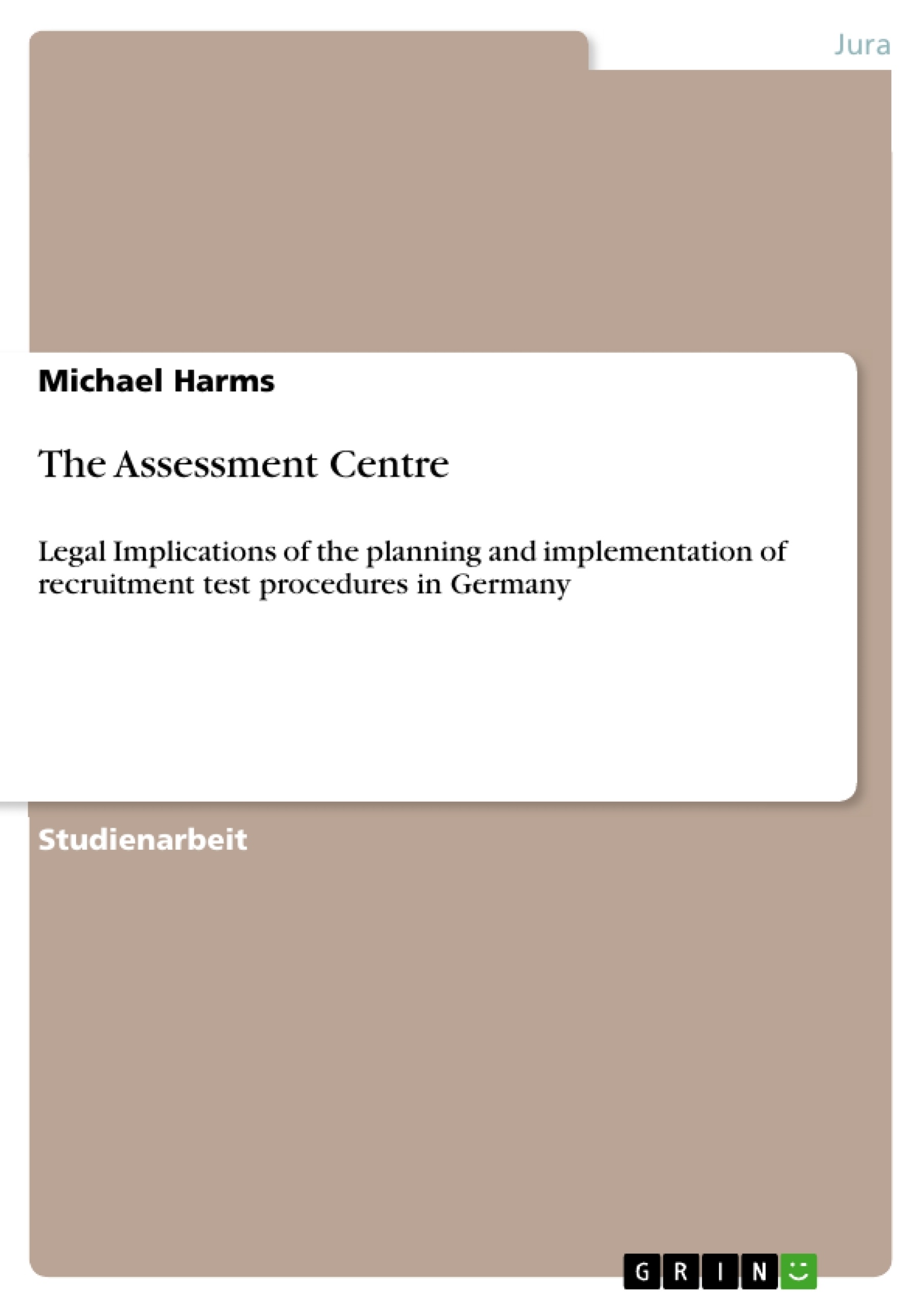Assessment Centre procedures (AC-procedures) are widely used as a target orientated business personnel applicant selection method, and are deployed in larger, and increasingly in medium scale companies. Whilst the currently available literature on this particular topic mainly covers the personnel policy and psychological aspects such as development, implementation and usage of AC procedures, but also strategies, tasks, exercises and the prognostic validity, the legal implications of conducting recruitment tests have hardly been looked into. However, it is especially in conjunction with individual and collective employment legislation implications and also under the legal aspects of data protection that the planning and implementation of an AC raises a number of different questions for human resources representatives in practice.
Through the combination of a number of different procedures, the AC tests prove a high degree of validity as far as the measurement of the actual suitability of the applicant is concerned, as well as a high level of accuracy and objectivity. But above all, they are highly transparent and offer the participants a good insight into, and comprehension of the procedures. Secondly, the advantages of an AC test, for the individual applicant, lie in the fact that it can reveal relevant statements about their potential, and give the applicant the assurance, because of the extra aptitude tests to see if they can do the job in question, that their abilities and aptitudes are in line.
This paper will first of all outline exactly what an Assessment-Centre is, what characteristics it has, when and under what circumstances it is appropriate to implement and what exactly takes place. With this as a basis, we will be looking at the legal implications of an AC procedure in great detail, and what one needs to consider legally when conducting such a test.
Thereby it is basically all about the question of exactly to what level the general personal rights and the human dignity of the participants are affected, what co-determination rights the works council have when introducing and conducting aptitude tests and what data protection rights implications do aptitude tests have. A final summery will conclude this paper.
Inhaltsverzeichnis
- Introduction
- Concept and role of the AC
- Concept
- Particulars
- Role
- Target group
- The AC cycle
- Compilation of a requirement profile
- Development of the exercise instruments
- The individual test procedures
- Individual test procedures
- Group exercises
- Written tasks
- Computer supported test procedures
- Follow-up and feedback
- Observation group
- Evaluation
- Feedback
- Legal implications
- General personal rights
- Extent of protection of the general personal rights
- Employers right to question
- Consent of the applicants
- Comparativeness
- Professional implementation
- Data protection
- Legitimacy of the data acquisition
- Duty of notification
- Disclosure rights
- Rectification rights
- Involvement rights of the works council / briefing of the executive committee
- The decision to execute an AC
- The decision on the assortment of participants
- Involvement of the executive employee committee
- General personal rights
Zielsetzung und Themenschwerpunkte
Diese Arbeit befasst sich mit den rechtlichen Implikationen der Planung und Durchführung von Assessment-Center-Verfahren (AC-Verfahren) im Rahmen des Bewerbungsverfahrens in Deutschland. Der Fokus liegt auf der Analyse der rechtlichen Rahmenbedingungen, die bei der Gestaltung und Anwendung von AC-Verfahren zu berücksichtigen sind.
- Rechtliche Rahmenbedingungen für AC-Verfahren im Bewerbungsprozess
- Schutz der allgemeinen Persönlichkeitsrechte der Bewerber
- Datenschutzrechtliche Aspekte im Zusammenhang mit AC-Verfahren
- Mitbestimmungsrechte des Betriebsrats bei der Durchführung von AC-Verfahren
- Validität und Objektivität von AC-Verfahren
Zusammenfassung der Kapitel
- Introduction: Die Arbeit stellt den Hintergrund und die Relevanz von AC-Verfahren im deutschen Bewerbungsprozess dar. Sie erläutert die wachsende Bedeutung von AC-Verfahren und die Notwendigkeit, die rechtlichen Implikationen zu betrachten.
- Concept and role of the AC: Dieses Kapitel definiert den Begriff des Assessment Centers und erläutert seine charakteristischen Merkmale. Es geht auf die verschiedenen Arten von AC-Verfahren ein und beschreibt ihre Rolle im Bewerbungsprozess und in der Personalentwicklung.
- The AC cycle: Dieser Abschnitt beschreibt die einzelnen Phasen des AC-Prozesses, von der Zusammenstellung des Anforderungsprofils über die Entwicklung der Testinstrumente bis hin zur Durchführung der einzelnen Tests und dem Feedback an die Teilnehmer.
- Legal implications: Dieses Kapitel befasst sich mit den rechtlichen Aspekten von AC-Verfahren. Es analysiert den Schutz der allgemeinen Persönlichkeitsrechte der Bewerber, die datenschutzrechtlichen Aspekte und die Mitbestimmungsrechte des Betriebsrats.
Schlüsselwörter
Assessment Center, Bewerbungsverfahren, Rechtliche Implikationen, Persönlichkeitsrechte, Datenschutz, Mitbestimmungsrechte, Betriebsrat, Validität, Objektivität.
Häufig gestellte Fragen
Was ist ein Assessment Center (AC)?
Ein AC ist ein zielorientiertes Auswahlverfahren für Bewerber, das verschiedene Tests und Simulationen kombiniert, um die Eignung für eine Stelle objektiv zu messen.
Welche rechtlichen Aspekte müssen beim AC beachtet werden?
Wichtige Aspekte sind der Schutz der allgemeinen Persönlichkeitsrechte, die Menschenwürde der Teilnehmer sowie datenschutzrechtliche Bestimmungen.
Hat der Betriebsrat Mitbestimmungsrechte bei Assessment Centern?
Ja, der Betriebsrat hat Mitbestimmungsrechte bei der Einführung und Ausgestaltung von Eignungstests und der Auswahl der Teilnehmer.
Wie steht es um den Datenschutz bei AC-Verfahren?
Die Erhebung von Daten muss legitim sein, Teilnehmer haben Auskunfts-, Berichtigungs- und Benachrichtigungsrechte bezüglich ihrer Testergebnisse.
Was sind typische Übungen in einem Assessment Center?
Dazu gehören Gruppenübungen, Rollenspiele, Präsentationen, schriftliche Aufgaben und computergestützte Testverfahren.
Warum gelten ACs als besonders valide Auswahlmethoden?
Durch die Kombination mehrerer Verfahren und Beobachter wird eine höhere Genauigkeit, Objektivität und Prognosegüte für den beruflichen Erfolg erreicht.
- Arbeit zitieren
- Michael Harms (Autor:in), 2009, The Assessment Centre, München, GRIN Verlag, https://www.grin.com/document/170405



